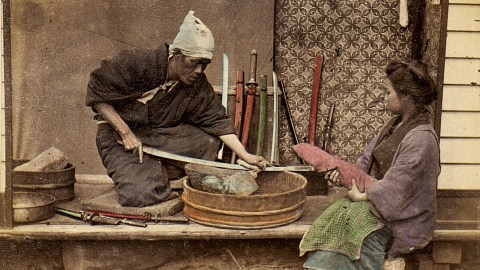“Meraki”: How to cultivate passion in your work

- Meraki refers to the act of doing something with passion and love. It means giving a piece of yourself to your work.
- To avoid burnout and promote better mental health, organizations should foster conditions for employees to express meraki.
- But for many, the workplace is not the place of meraki. For these people, they need to devote more of themselves elsewhere.
There is a particular type of person on social media who is, at first glance, insane. They’re the ones who post things like, “I can’t wait to get back to work,” when they’re on holiday, or, “I don’t work for the money — I work because I’m driven to succeed!” (You can find more of these people on the subreddit r/LinkedInLunatics.) This attitude might seem strange. After all, work is work, and anyone who enjoys it more than their free time must be unhinged, right?
If you spend enough time online, you might see these sentiments popping up over and over again. After a while, you might start to think you’re the insane one. Maybe you’re weird for finding work a slog and for wanting to go home at the end of your contracted hours.
Worry not. You are no slacker. But work truly is a passion for some people. They enjoy turning up, finishing a task, and reveling in the challenges work gives them. These people have made a vocation out of employment. And the Greeks have a word for this: meraki.
Pouring out of the soul
Meraki is when you do something with so much love and attention that you give a little bit of yourself to it. Meraki walks the line between passion and occupation. It is not simply a hobby or pastime, and it certainly is not the resentful grind of the wage slave. It is much more. When you do something with meraki, you invest a bit of your being in that thing. The object of your labor is no longer simply something created, but something endowed. It might be as simple as making a meal for a loved one, or it could be as grand as spending every waking minute writing a symphony. In each case, you leave a bit of yourself in what you have made.
The philosopher and theologian Martin Buber once said, “All real living is meeting.” Meraki invites us to meet life and engage attentively in every moment. Buber argues that the best of life is when we form a relationship not only with other human beings but also with the objects around us. So, meraki is when we build a kind of relationship with our work. Imagine a gardener who cradles every seed and nurtures it to life. Years later, that same gardener might be sitting under the shadow of a great and bountiful tree. As he rests, he identifies and recognizes a bit of himself in that tree that was once a seed. That is what meraki means.
You cannot experience meraki without love. A mother washing her daughters’ clothes, a father reading a bedtime story, a brother wrapping a present for his sister — all of these are acts of labor imbued with love. Grief, too, will often involve meraki. In creating a memorial or preparing a funeral, every task is imbued with lost love. If you spend any meaningful time in a graveyard, you’ll experience the echoes of meraki. Each of the dedications, or the flowers left at a graveside, are the poignant act of someone who has given a bit of themselves to the task.
The modern lack
It might be harder to imagine meraki in the modern workplace. Pushing numbers around on a spreadsheet or drafting another policy document does not seem to be a labor of love. People often feel alienated from their workplaces and turn up to their jobs resentfully. Many employees today act entirely as mercenaries. An employee’s mindset is often extractive, asking, “What can I get from this job?”
But meraki is about what you give to a job. It is this fact that seems to lie at the heart of many modern problems. In an interview with Big Think’s The Well, the cognitive scientist Laurie Santos points out an issue called “depersonalization.” This is when you start to see not only a job as some horrible imposition but also the people involved in that job as impositions as well. As Santos puts it, “Are you embarrassed about the length of your fuse? Do you feel like you’re going through some compassion fatigue? That’s a clear sense that you’re experiencing depersonalization.”
Most jobs today involve working with or for other people. When you hate your job and view it in an extractive, anti-meraki manner, you inevitably will see those people as objects. You will depersonalize them. This is a far cry from Buber’s message: “Real living is meeting.” And if you see work as entirely made up of cold, oppressive objects, you not only risk your mental health but also burnout.
More meraki
So, how can we avoid burnout and live, in the sense that Buber imagines? Santos gives two bits of advice.
For organizations, “[It is important] to make some changes to people’s workloads, to people’s sense of values, and to the rewards that people are getting.” When a job advertisement says, “we are a family,” it’s often a red flag and euphemism for, “We expect you to work yourself to death.” But it shouldn’t be. Businesses and organizations need to make efforts to allow employees to identify with their workplace, and to give a bit of themselves to what they do. Allow personality. Encourage creativity. Feed passion.
For individuals, Santos’ advice is to remember that not all work can be meraki. Some jobs always will be crap, and some people do not have the luxury of quitting to find their “labor of love.” In these cases, remember not to place “too much of your identity emphasis on work… and reengage more with other things that [you] value.”
We all need meraki in life, but it might not be in the 9-to-5 grind. Instead, try to find it in other areas of life. This doesn’t mean “take up more hobbies,” but rather that you can consciously and willfully devote yourself to something. Give your passion and full attention to something. Give a bit of yourself. As Buber argued, this is what real living is about.





